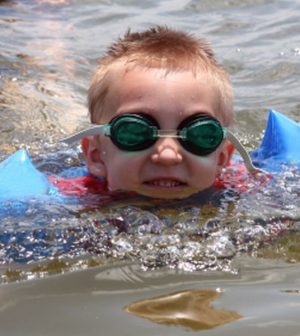- Recognizing the Signs of Hypothyroidism
- 10 Strategies to Overcome Insomnia
- Could Artificial Sweeteners Be Aging the Brain Faster?
- Techniques for Soothing Your Nervous System
- Does the Water in Your House Smell Funny? Here’s Why
- Can a Daily Dose of Apple Cider Vinegar Actually Aid Weight Loss?
- 6 Health Beverages That Can Actually Spike Your Blood Sugar
- Treatment Options for Social Anxiety Disorder
- Understanding the Connection Between Anxiety and Depression
- How Daily Prunes Can Influence Cholesterol and Inflammation
How Summer Camps Can Shield Your Kids from Allergies, Asthma & COVID

As kids get ready for summer camp, parents might be fretting about exposure to COVID-19, but a doctors’ group says they also need to make sure their campers will be protected from allergy and asthma triggers.
“The [Centers for Disease Control and Prevention] has issued guidelines for keeping campers and staff protected from COVID-19. At the same time, camps still need to make sure measures are in place in case a camper has an allergic reaction or an asthma flare,” Dr. Luz Fonacier, president of the American College of Allergy, Asthma and Immunology (ACAAI).
Kids with asthma or allergies should see an allergist before going to day or overnight camps, she said in an ACAAI news release.
Your allergist can offer tips on informing camp staff about your child’s triggers, medications and treatments; and confirm that your prescriptions are up to date, symptoms are under control and dosing hasn’t changed over the school year. He or she can also create a personalized plan for you to share with the camp.
If your child has food allergies, it’s important to inform camp personnel before camp begins and remind your child to be on the lookout for allergens. Ask kitchen staff how they handle the possibility of cross contamination and let counselors and medical staff know the foods that will trigger an allergic reaction in your child.
Your child should tell other campers about their food allergy so that if an allergic reaction occurs, they will be prepared to help. If your child has an epinephrine auto injector, make sure it’s working, that there’s enough on hand to cover an emergency and that your child has a spare.
If your child has asthma or food allergies, consider a camp tailored to children with allergic conditions. These camps have specialized medical staff and personnel who understand how to treat allergies and asthma and how to administer epinephrine. An online search should turn up a camp in your area.
Rashes from poison ivy or poison oak can be more severe in kids with allergies, and may require a trip to the camp nurse or doctor. Depending on the severity of the rash, they may be prescribed an oral corticosteroid or antibiotic.
More information
The Asthma and Allergy Foundation of America has more on allergies and asthma.
SOURCE: American College of Allergy, Asthma and Immunology, news release, May 5, 2021
Source: HealthDay
Copyright © 2026 HealthDay. All rights reserved.










